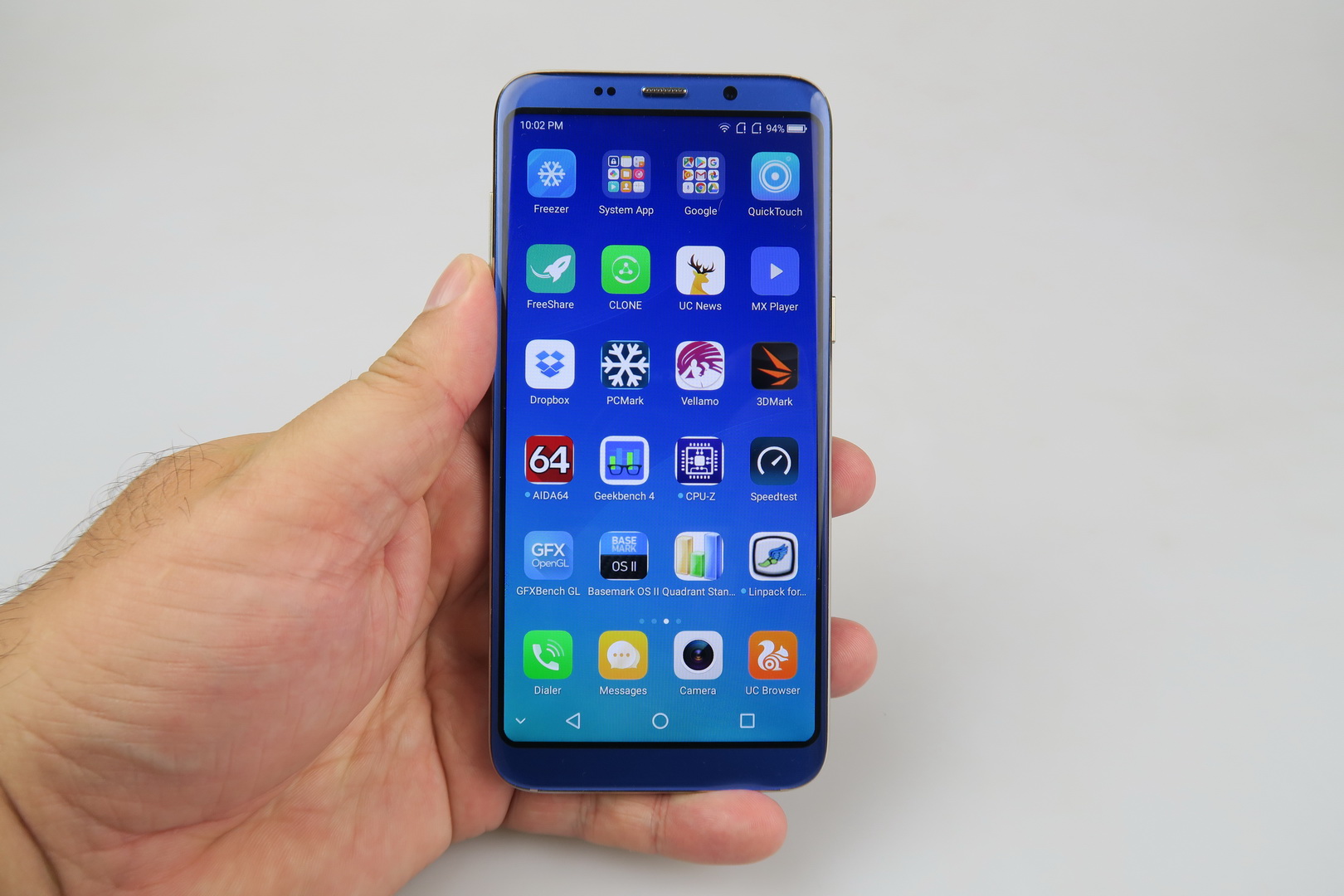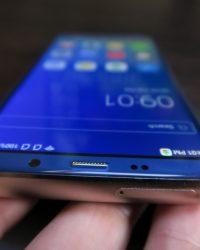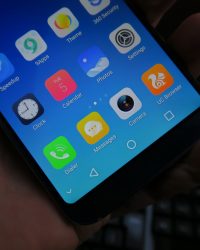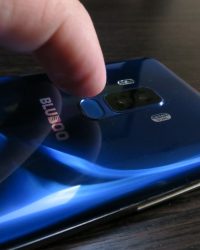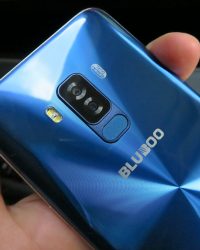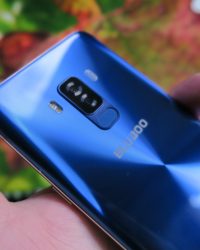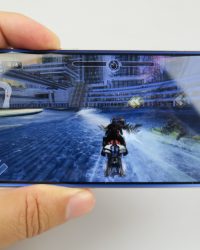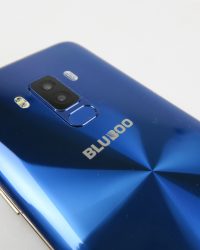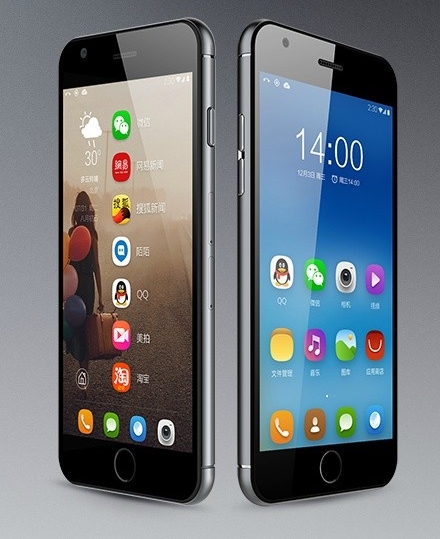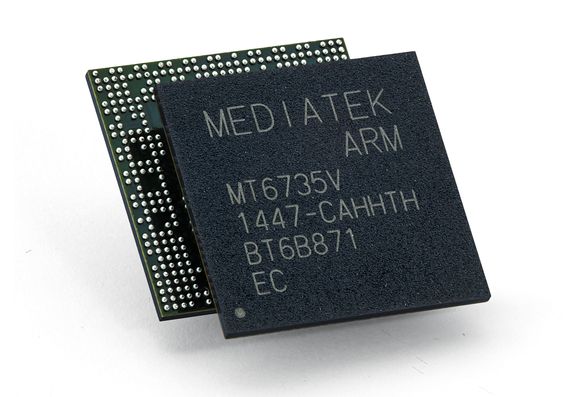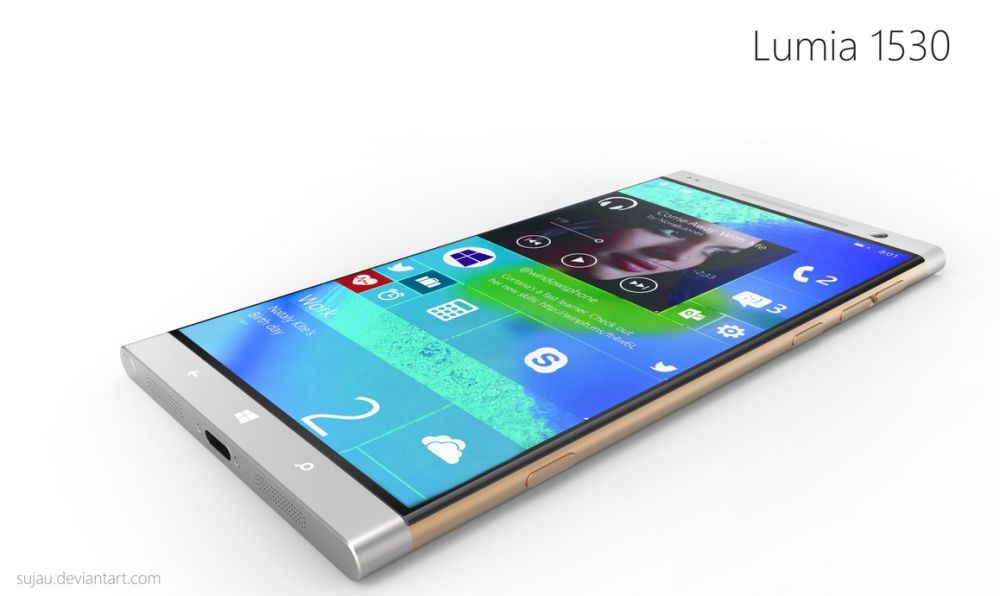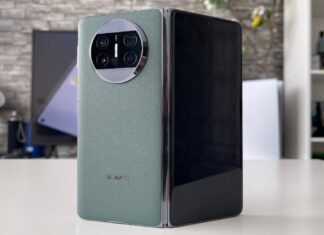The amount of clones that the Xiaomi Mi Mix and Galaxy S8 have received stand as a testimony to the success of those formats. Since imitation is the most sincere form of flattery, Bluboo imitates the Galaxy S8 via the Bluboo S8, which we reviewed below. This device is priced at around $150 on Banggood.com and it’s a pretty good looking glass and metal device, with a dual back camera.

It’s got midrange specs and comes in gold, black or blue. We’re no strangers to Bluboo devices, having tested the Bluboo S1 and the Bluboo Picasso 4G handsets. The Bluboo S8 measures 8.4 mm in thickness and weighs 200 grams, or perhaps even more, since various sources online have different weight measurements. As a comparison the Galaxy Note 8 measures 8.6 mm in thickness and the Galaxy S8 8 mm.
We’re dealing with a 5.7 inch here and also a pretty interesting tri bezel less display phone with an 18:9 aspect. Aside from the curved glass, Bluboo S8 also uses a zinc-titanium alloy, for extra sturdiness. The glass back has a CD-like effect, but at times I had the feeling that it wasn’t actually glass, but rather plastic, at least judging by the texture.

This is a big and massive phone, with a tough look and thick frame. This S8 has curved corners and sides, certainly being a beautiful phone, but also very heavy. It’s even heavier than some battery phones out there. The imitation of the Galaxy S8 is very well done. The back side is a bit of a fingerprint magnet though. It’s a sexy phone for sure, perhaps one of the sexiest priced below $200.
Moving on to the display, we get a 5.7 inch IPS LCD panel made by Sharp, with a 1440 x 720 pixel resolution and 10 point multitouch support. You can use the screen with a glove or wet hands, so that’s something nice to have. The experience was immersive, the colors were well calibrated and the brightness was quite high. View angles are wide and the contrast is also OK.

Pixels have an RGB Stripes arrangement and the luxmeter we used showed a value of 423 LUX. This is a pretty solid value, putting the phone above the Sony Xperia Z3 and OnePlus One, plus the HTC U11. It’s also below the Huawei P9 and the ASUS ZenFone 3, by the way. Settings are quite varied and generous for the screen, including Miravision ones, with modes like Standard, Vivid and User, the latter letting you tweak contrast, saturation, brightness, color temperature, dynamic brightness, plus there’s Blu Light Defender, used to get rid of the blue light that affects your sleep.
You can obviously tweak the brightness and font size. I’d say the screen is OK, but for such a big diagonal HD doesn’t cut it anymore… We now go inside the handset, where we find some pretty familiar components. For one there’s the octa core MediaTek MT6750T processor, clocked at 1.5 GHz, plus the Mali T860 MP2 GPU, 3 GB of RAM and 32 GB of storage.

There’s also a microSD card slot. The device’s UI seemed pretty fluid in day to day use and I didn’t experience any major lag. Riptide GP Renegade ran fine, with a pretty good frame rate, but the phone overheated in the process. We also did benchmarks, achieving results higher that the first HTC One M7 and Huawei Honor 6, which are pretty old phones right now.

We scored below the Moto G5 and ASUS ZenFone 2 Deluxe, while in AnTuTu 6 we barely beat the modest Lenovo Phab Plus and ASUS ZenFone 3 Max, but scored below the Vernee Thor and Huawei Honor 5X. In 3DMark Slingshot Extreme we beat the Nubia N1 and Xperia L1, reaching a mere 50% of the Sony Xperia XA1 score. As you can tell, the benchmarks are rather poor, feeling like taken from a 2014 or 2015 phone.
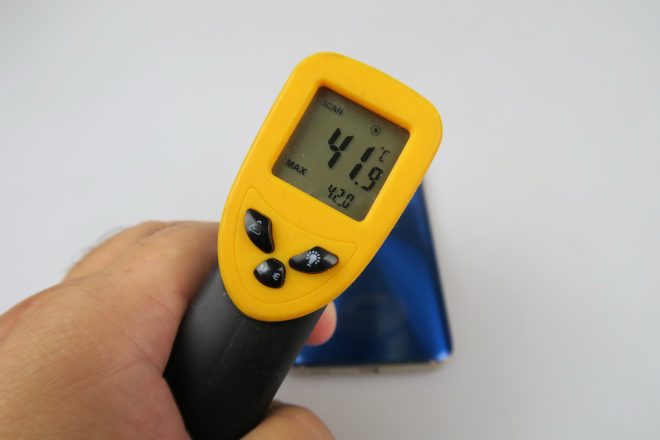
The temperature is also a problem, as the device goes to 42.3 degrees Celsius in GFXBench and 42 degrees in Riptide, so yes, there’s overheating. We also did a battery test and at first sigh the 3450 mAh sounds great, but in reality it’s something else alltogether. This unit also promises quick charging, by the way. We did our usual video playback test achieving an abysmal 4 hours and 20 minutes, barely enough to watch two full length movies.
It may surpass the LG G Flex 2 and Evolio Onyx, but these are by no means performers. We also scored below the HTC One M9 and Huawei P8 Lite. Things get bad in the PCMark test too, with a 4 hour and 4 minute usage time, placing the phone on the 147th spot from all the handsets we’ve tested. It beats the Huawei Honor 6 and HTC One, but scores below the Amazon Fire Phone and Huawei P8 Lite.

Charging is by no means fast, at 2 hours and 47 minutes, but at least it beats the Vernee Thor. When done in steps, we took the handset to 3% in 5 minutes and to 14% in 15 minutes. 30 minutes of charging equals 30% and one hour is 61%. Battery settings include Power Save, Smart Power Saving and Ultra Power Saving. Each of them provide CPU, network and brightness tweaks to squeeze more minutes out of the battery.
This is one of the worst batteries I’ve seen on a phone over the past years, to be honest…
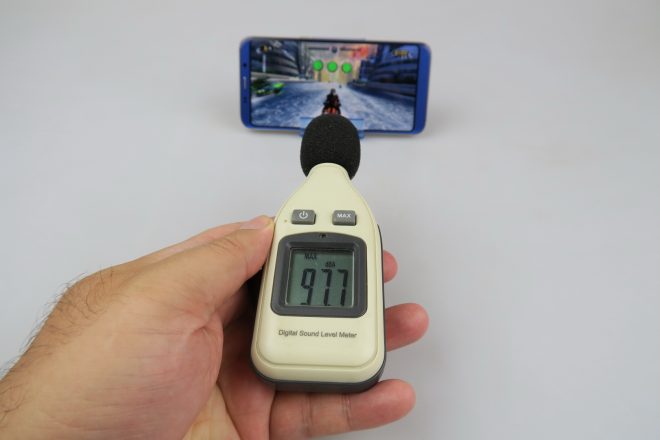
We did a decibelmeter test and achieved 86 dBA at the front and back of the phone, with our typical audio sample. This beats the Galaxy Note 5 and Xiaomi Redmi 4, but it’s inferior to the OnePlus One and Nokia 3. In Riptide GP Renegade we scored 97.7 dBA, a solid result, that was superior to the Huawei P10 Lite and Motorola Moto G5. Still we’ve heard louder on the Xperia XA1 Ultra for example.
There aren’t any headphones bundled here, but we do have FM radio, in case you were wondering. Overall I’d say the acoustics are pretty OK, but not stellar. Now let’s discuss the dual camera at the back. Apparently it includes two Sony sensors, a 13 MP one and a 3 MP one, plus a dual LED flash. With interpolation you can take 16 MP shots and overall this mechanism feels similar to what we saw on the Bluboo S1.

Upfront there’s a 5 MP camera, that takes 8 MP shots via interpolation. The Camera app starts up fast, but the zoom was slow and the focus also sluggish. Options and settings are rather typical, with stuff like HDR, Panorama, Watermark, Time Lapse, Beauty Video and Aspect (16:9 or 4:3). There’s also face recognition and bitrate setup, as well as anti flicker.

Face Cute and Bokeh make the cut too. Time to see if the pics are any good. First of all, much like the Bluboo S1, the whole dual camera thing seems like a fantasy. The Bokeh you trigger here is basically a halo of blur thrown around the central area of the pics. Basically, the second camera is kind of useless. We took day time pictures on a 30+ degree Celsius weather, when the summer had its last breath.
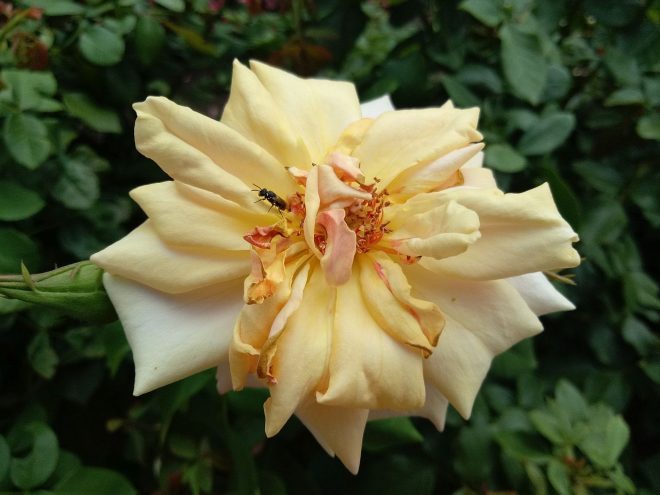
The details were OK, colors were accurate and there was some oversharpening. HDR felt too white, but the focus was precise and closeups looked nifty, that macro flavour everyone loves to post on Facebook. Panorama is rather small, at 2944 x 520 pixels and the objects, people and buildings have a nice texture. Flowers look great, but landscape shots not so much.
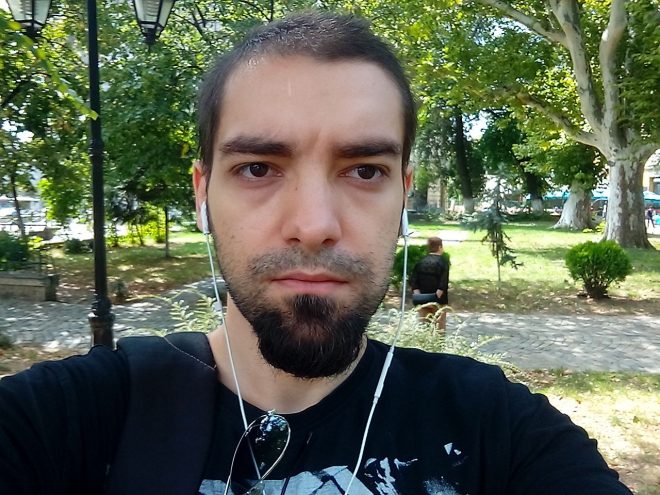
Some of the pics we took were blurred, but less than usual and less than the Bluboo S1 produced. In general I was happy with how crisp the shots were. I’d say the selfies were also pretty good, in both skin and hair texture, as well as clarity. I’d put thsis phone on par with the Galaxy A5 (2016), which itself can hold its own in front of the Galaxy A5 (2017) even today.

Bluboo S8 can also fight the Huawei P10 Lite and actually the day time pictures weren’t bad for this price. Low light photos taken with the flash on have a red hue to them and in general pictures were quite dark. The buildings had a pretty palpable texture and I’d say the details were reasonable. Street light halos were huge and the zoom kind of surprised me, because not many details were lost.
I’d say we took some pretty solid landscape shots this time around and the clarity wasn’t half bad. To be honest, I’ve seen worse, on Nubia, UMi phones or Leagoo ones. It’s 70% of a good midrange device’s potential. On the video capture front, we’re filmed in MP4 format, in Full HD, at 30 FPS and with a bitrate of 9 Mbps. We’re used to seeing something like 14 or 17 Mbps in the bitrate area. The camera’s mic doesn’t handle the wind well and the zoom was rather poor.
Exposure change is OK and colors aren’t bad. Stabilization is poor and the zoom is hard to control with a mere pinch. Don’t let the bad things I mentioned discourage you, because filming was actually pretty good, the core, the kernel of the experience. Colors were nice, focus was spot on and the dynamic range somehow didn’t mess things up. Things get shaky when walking about and filming, but things remained very clear.
There was no burnt area and the microphone was OK in general, when the strong wind wasn’t present. This camera even manages to burn the videos less than the Galaxy A5 (2017). It could even fight the midrange Xperias the XA1 and XA1 Ultra, but it’s not quite there. In low light conditions we shot at 5 Mbps and things were very dark, there was focus loss and no object tracking.
I’d say the videos were weirdly dark and we registered some strange violet hues, OK sized halos and things felt kind of wrong, plagued by a bug maybe. With the camera offering some pleasant surprises, I’d say it’s time to move on. We tested the web browser preinstalled here, UC Browser and it was kind of slow, with the benchmarks also confirming that.

We used a custom keyboard which was pretty comfy and it also had its own numeric row and Swype. On the connectivity front there’s USB Type-C, but it’s version 2.0, not 3.1 and we actually had some trouble with it disconnecting from the PC out of the blue. There’s WiFi a/b/g/n in the mix, GPS, Bluetooth 4.0 and 4G LTE with 5 band support. This is a dual SIM dual standby phone, with Glonass and sadly the WiFi also dropped on us a a couple of times.
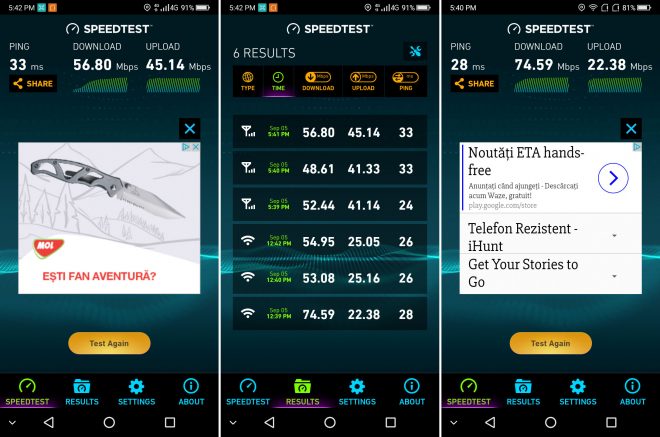
The dialer offers call recording and speed dial, but the call volume was modest. Clarity was at a mid level. In SpeedTest we achieved 74 Mbps in download on WiFi and 25 Mbps in upload. On 4G we got to 56 Mbps and 45 Mbps in download and upload respectively. As far as the OS goes, we’ve got Android 7.0 here with Bluboo UI 2.0 on top. It’s got a colorful and minimal approach, maybe even childish. You’ll see a snowflake or deer symbol among the icons and folders, confirming the approach.
The leftmost homescreen is dedicated to a sort of Google Now alternative, with News and shortcuts grouped together. Multitasking is done with the aid of cards and you can swipe up to use the whole split screen thing. The lockscreen features shortcuts for the main apps, by the way. Keep the homescreen pressed triggers widgts, wallpapers, batch arrange, transitions and settings.

The dropdown portion hosts the usual notifications and Quick Settings. Now off to the Settings. That area includes a cloud service and the fingerprint scanner, which also lets you take a picture by pressing it. The fingerprint scanner has a 20 step setup and I’d say it has an OK unlock speed, but it’s not accurate 100% of the time. The preinstalled apps list doesn’t have much bloatware, just about two dozens of apps to use.
The apps are all placed on the homescreens and those include Speedup, which optimizes the handset use. There’s also 9 Apps, which is an app store, Theme, Notes, Quick Touch, which is a floating dock, free share and clone.

Now it’s time for the verdict. So, let’s see the Pros and Cons.
These are the Pros:
- nice design and build
- bright screen
- no lag
- loud audio
- the camera has some pleasant surprises
- the software didn’t bother me
These are the Cons:
- poor battery
- heavy
- poor benchmarks
- overheats
- distorted audio
- WiFi drops
- no real Bokeh
- pink videos in low light conditions
Bluboo S8 is a vanity phone basically, that looks good in your hand and could fool a newbie that it’s a Galaxy S8 at first sight. Yes, it’s heavy, but it’s also well built and has a pretty OK camera. It does have a few major deal breakers, like the battery and WiFi drops, but if there was ever a time to not be picky, it would be a $150 or less phone, II say.
If you want pictures, Facebook, YouTube and good looks that’s about it. It’s a vanity buy in the end and it makes sense in that case. You can get the handset here.

